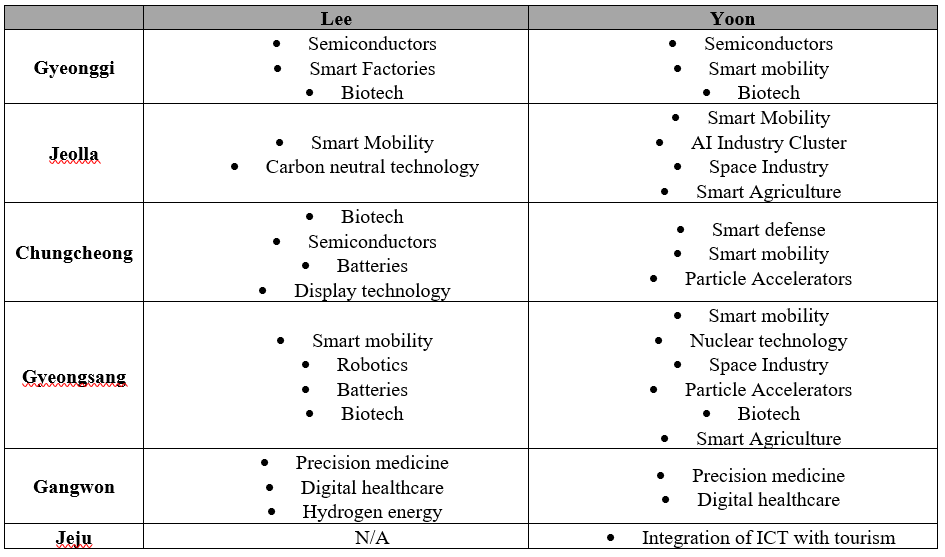The Peninsula
How Korea's Next President Will Approach Tech

The campaign for the March presidential election has been marred with partisan attacks and personal scandals that are reflective of the deeply seated fissures in Korea that mirror the emergence of bipolar “mega identities” in the U.S., especially as a backlash to the alleged successes or failures of the progressive Moon Jae-in administration. But in stark contrast to the polarization at the campaign level, observers have commented that the policy platforms of the two candidates have been converging, even in the most controversial issues such as housing and real estate. This observation holds with their platforms on science and technology: there is no significant divergence between the Democratic Party’s Lee Jae-myung and the People Power Party’s Yoon Suk-yeol regarding their policy visions on science and technology in terms of content, as demonstrated below.
Lee has articulated his vision for science and technology (S&T) through the language of big or interventionist government, and while Yoon’s platform has emphasized more market-driven rhetoric, its broader direction largely remains aligned with Lee’s policies. Both candidates have expressly acknowledged the importance of emerging technologies, and their platforms suggest that whether Lee or Yoon gets elected, Seoul will likely continue actively directing government support for R&D and digitalization, as well as in education and skills training, SMEs, and fostering more balanced regional economic growth through niche local clusters.
Continued Support for S&T and Digitalization
Both candidates view the Fourth Industrial Revolution technologies as key to South Korea’s global competitiveness. Their platforms indicate continued national-scale investment in R&D and the adoption of emerging technologies. Technically, Lee should be the ‘big government’ candidate and Yoon the ‘small government’ candidate, but both candidates seem to take a big government approach on technology in terms of substance, which might be reflective of the realities of the COVID-19 period or a response to the needs of the digital age.
Lee has articulated a narrative of “expanding” South Korea’s “digital territory” and strengthening its “technological Sovereignty,” and made the “great transformation” a key pillar of his platform. Lee’s platform highlights AI, quantum computing, space, smart mobility, next-generation batteries, semiconductors, bio-health, next-generation network, decarbonization, and cybersecurity as the ten areas of focus for “Big Projects” to be managed by the Blue House. Lee promises to raise 5 trillion won ($4.2 billion) over the next five years to support mission-oriented projects in these areas of focus. Park Young-sun, the former Minister of SMEs and Startups and the chair of the “Great Digital Transformation” committee for Lee’s campaign, said that she expects the Lee administration to increase the nominal amount of R&D spending to reach top three in the world under the Lee administration. Ultimately, these measures would transform South Korea into one of the top five S&T economies globally.
Lee Jae-myung’s Seven S&T Election Promises
- Create the position of Deputy Prime Minister of Science and Technology
- Establish technological sovereignty through the acquisition of strategic technologies
- Develop domestic space technology and land on the moon by 2030
- Expand science and technology research that contribute to the solution of social problems
- Improve regional technological capacity by providing greater R&D flexibility
- Foster a research environment centred around the needs of S&T researchers
- Broadly develop S&T workforce/talent
While Yoon’s platform does not highlight significant national-scale investments in the same way that Lee’s has, his policies on talent and SMEs, industrialization, and regional economic development (discussed below) altogether indicate that his administration would not veer off significantly from the path of digitalization and support for S&T in substance.
Stronger Integration and Coordination of Digital Policies
Seoul has invested significantly in the R&D and digitalization policies over the past few years, especially more so through its COVID-19 response policies. As is the case for other economies, too, Seoul is confronted with the challenges of better integrating digitalization into different policy areas and coordinating a much wider range of policy jurisdictions. In this context, it is unsurprising that both candidates have pledged measures for more robust integration and coordination of digitalization.
Yoon’s platform promises to launch the “Digital Platform Government,” which would connect all government departments to make public administration much more efficient. More specifically, Yoon’s government would develop a one-stop website (“My AI Portal”) where each citizen would be assigned an ID that pools all their data from different government ministries and allow them to access and manage their data on social services, healthcare, lifelong learning/employment training, or job search. Yoon’s platform site promises that this site will provide a personalized service “like a butler.” In turn, the collection and centralization of big data would add greater efficiency to the provision of public service.
Similarly, Lee’s platform promises greater centralization and coordination of digital policies. Most significantly, Lee has pledged to re-create the position of Deputy Prime Minister of Science and Technology, a position that had disappeared since the end of President Roh Moo-hyun’s term. Simply put, this position would elevate the Minister of Science and ICT to the level of Deputy Prime Minister, which would allow them to exercise greater influence in aligning the science and technology policy into the broader national strategy and gain access to greater budgetary discretion. Further, Lee’s platform promises to establish a department specializing in data governance and appoint the commissioner of the National Data Policy Commission as the Chief Data Officer of the country to oversee data governance at the national level.
SMEs, Jobs, and Talent
Both Lee and Yoon have indicated greater support for entrepreneurship, SMEs, and the training of digital talent in all ages. Lee’s platform calls for “100,000 Digital Talent” and promises to better integrate digital curricula into primary, secondary, and tertiary education. Lee’s policies would support the “great transformation” of the SMEs towards digitalization, as well as creating more funding opportunities and fostering a more favourable environment for start-ups.
Similarly, Yoon has promised greater support for early-stage start-ups and their scaling up, as well as providing ICT-based training in smart agriculture or “silver economy” to create more employment and entrepreneurship opportunities. His platform promises to double the size of the Korea Fund of Funds to support entrepreneurship, particularly for youth and women. For supporting the transition into new industries, Yoon’s government would grant long-term financial support and five-year deferrals for loans, as well as providing aid for R&D, investment tax credit, and workforce training. For mid-sized companies transitioning to new industries, the government would provide a 10% investment tax credit and 25% R&D tax credit.
Regional Development and Technology
A perennial challenge for South Korean leaders is regional development – that is, decreasing the dependence on Seoul and balancing the growth across all regions. Combining this goal with S&T policy, the current administration has created different industrial clusters in each region to streamline support and maximize local strengths. For instance, the Moon administration designated the Gangwon province as the cluster for precision medicine, and the city of Gwangju in the Jeolla province has been emerging as a hub for smart mobility and integration of AI into the industry. Lee and Yoon have highlighted specific industries to support in each region (see the chart below), which seek to leverage existing strengths and policy measures. Here, neither Lee nor Yoon will depart markedly from the current administration’s direction.
It is also worthwhile to note Yoon’s concept of “the New Industry Central Belt,” which would combine and leverage different clusters with expertise on biotechnology, information technology, nano, and energy spread throughout the Chungcheong province and the continued growth of Sejong as South Korea’s administrative capital to foster regional economic development.

More of the same, or will there be any marked difference?
From the outside perspective, both candidates propose a big government approach to their S&T policies. Lee is a known policy wonk, and his platform has more details on the S&T policy where it is clearly articulated that the government – especially the executive – will be heavily involved. Yoon’s platform features fewer details on the policy compared to Lee’s, and as a conservative candidate, he emphasizes the importance of “market-driven” solutions.
But looking at the platform holistically, it is clear that Yoon will not veer off greatly from the current direction pursued by the Moon administration on S&T, and it is difficult to find any point of major divergence between the two candidates on most substantial issues. Yoon has not attached projected costs to his S&T platform, so it is uncertain as to whether the government investment in R&D and digitalization, which remains as the world’s highest percentagewise, would decrease if he were elected. However, as Yoon’s visions for S&T do not differ drastically from Lee’s or Moon’s, it will be unlikely to see a major cut as it would entail a significant departure from the status quo.
Finally, Lee and Yoon have shown different attitudes towards the social and ethical dimensions of new technologies. For instance, while Lee has been highlighting the importance of protecting constitutional freedoms and basic rights in the digitalized economy and society and pledged to create regulations against the use of deepfakes, Yoon’s campaign has largely focused on the practical benefits of digital technology but did not address these issues in depth. Particularly, Yoon’s idea of “My AI portal” entails the pooling of sensitive data across government departments that could be construed as state overreach, but it is not accompanied by measures that address concerns over privacy or civil rights. Further, Yoon’s campaign recently launched the “AI Yoon Suk-yeol,” an AI avatar of the candidate, prompting a review by the National Election Committee and raising concerns among journalists and academics, which is ironic considering that Lee’s platform calls for a strict regulation of deepfakes. These nuances could arguably be a significant point of divergence between the two candidates.
Overall, however, there seems to be no major divergence between the two candidates when it comes to science and technology policies, and Seoul will likely continue its track of big, interventionist government promoting the R&D and adoption of new technologies, regardless of the outcome in the March election.
Dongwoo Kim is a Contributing Author at the Korea Economic Institute of America and a J.D. candidate and Massey College Junior Fellow at the University of Toronto. The views expressed here are the author’s alone.
Image from LastHuckleBerry’s photostream on flickr Creative Commons.
